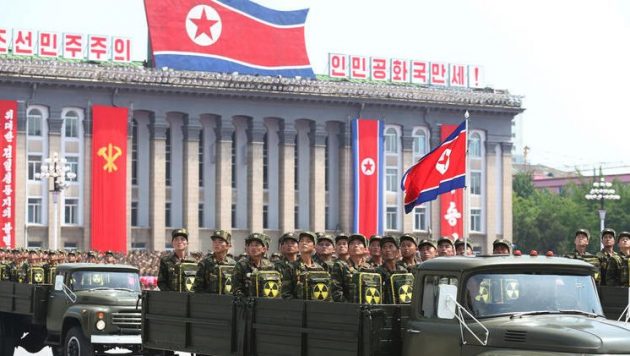North Koreans are forced to perform $975 million in forced labor every year according to an NGO called Open North Korea.
“Sweatshop, North Korea,” is the title of the report that says 400,000 of the lowest class people are used for slave labor in that country. They are referred to as dolgyeokdae. The total population is Korea is 25 million.
This tier of workers is made up of military-style brigades of ragtag youngsters assembled by local governments and put to work on construction sites for little to no pay. They are called on to complete major construction projects around the country, the report says, often working late into the night without safety equipment.
Park Kyung-ho, a former dolgyeokdae worker who fled North Korea in 2009 and now lives in South Korea, is quoted in the report saying that his monthly earnings were 120 North Korean won per month — less than $1 today, at official exchange rates, barely enough to buy two pieces of candy. “We were required to do 10 years of what was effectively unpaid labor,” Park said.
In most cases the Dolgyeokdae workers are young and untrained and are often involved in work-related accidents that cause injury or death–and without any compensation for the victim or the victim’s family. The government declares to them that this work glorifies their leader and that is their only motivation to work without pay. If they refuse, they are imprisoned.
On state television in North Korea, they are pictured working in subzero weather with captions saying: “outstanding loyalty to the Supreme Leader.”
The next step in job promotions is up the scale from dolgyeokdae to the North Korean 1.2-million member army. This army is frequently assigned to work on construction projects that have nothing to do with defense, for example to build exclusive villas for top officials. A third level is comprised of women called inminban who work at basic neighborhood maintenance. They do not receive pay and are expected to pay for their own supplies.
But not all North Koreans live like this. The country has an elite class of government officials and business-people who live comfortably in modern apartments and travel abroad. There is also a class of North Koreans who earn decent livings trading goods on the black market. Visitors nowadays to Pyongyang, the capital city, come home with stories of streets full of new cars and stylishly dressed locals carrying cellphones and expensive handbags.







Freedom United is interested in hearing from our community and welcomes relevant, informed comments, advice, and insights that advance the conversation around our campaigns and advocacy. We value inclusivity and respect within our community. To be approved, your comments should be civil.